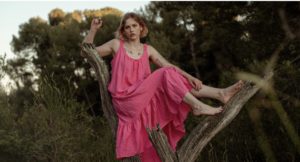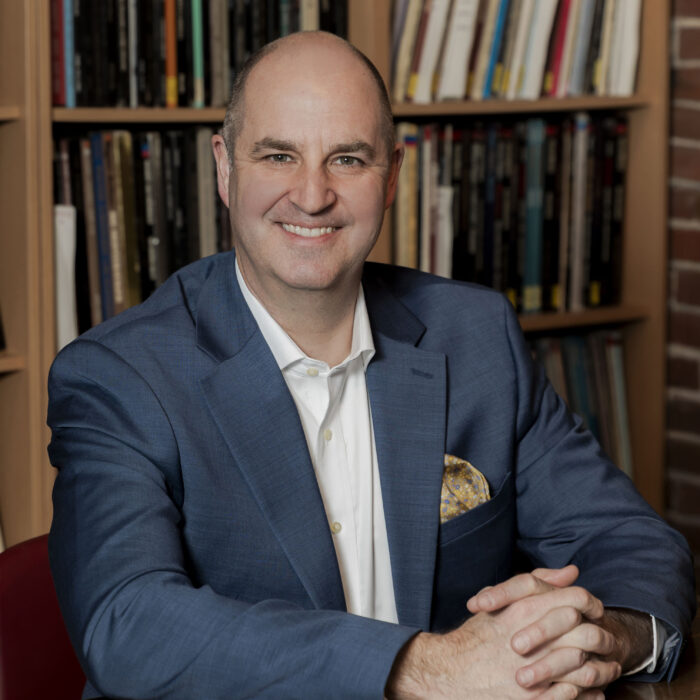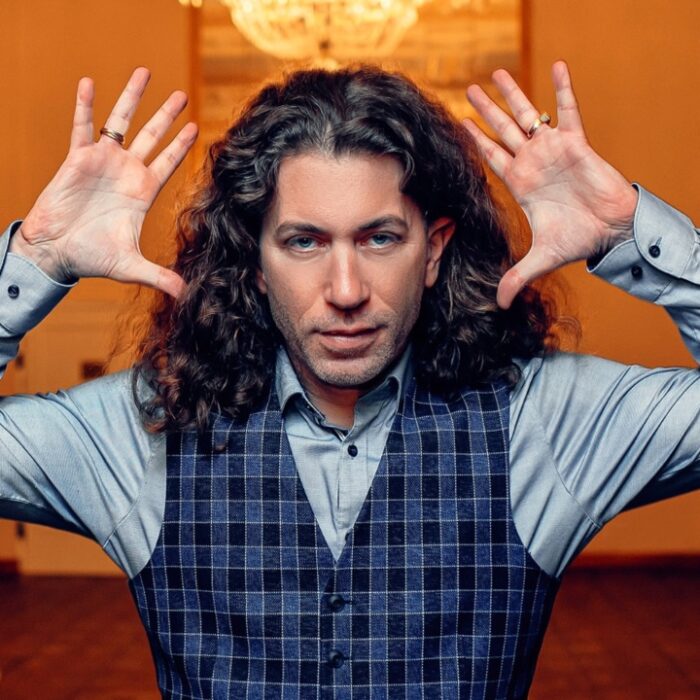
Q & A: Vilma Jää on Performing Markéta in Saariaho’s ‘Innocence’ & her Dream of Reviving Finnish Folk Music Traditions
By Alan Neilson(Photo: Mary Em)
Kaija Saariaho’s new opera “Innocence” premiered at this summer’s Festival d’Aix-En-Provence to widespread acclaim. “Innocence” is about a school shooting in an International school. In the role of Markéta, one of the shooter’s victims was the young Finnish singer Vilma Jää, who found herself receiving enthusiastic applause for her extraordinary performances.
Jää is a marvelous singer with a high-lying, crystalline soprano, but she is not an opera singer, rather her expertise lies in the field of Finnish folk music; a singer-songwriter and academic with a specialty in Finno-Ugric singing techniques and herding calls, which she employed in essaying her role as Markéta. Anyone familiar with the Norwegian Sami singer Marie Boine Persen will get a sense of her style of singing, although Jää would, no doubt, be quick to point out their significant differences. OperaWire discussed with her at length, not just her role as Markéta, but also her own eclectic compositions and her ambition to return traditional Finnish folk music to the folk.
OperaWire: What is your musical background and what encouraged you to become a folk singer?
Vilma Jää: My whole life since I was a child has been around music, and I always knew I was going to be a musician when I grew up.
Even though my parents are not professional musicians, they love music. My father has always sung in choirs, especially classical music, and he loves opera. He was so proud when I got the role in “Innocence.” My mother is involved in folk music, especially in folk dancing, and used to produce folk events and festivals around Finland.
I started playing music at the age of four. I guess I must have been to a concert with my parents and fell in love with the classical violin, and so I asked them if I could have lessons. They said yes and so I started and continued until I was 14. But you know what teenagers can be like: I started to think that orchestras were so boring and didn’t feel like playing anymore, so I stopped.
However, I did miss playing, and I suddenly started to take notice of the violin music at the folk festivals which I went to with my mother. It was very strange because I had grown up around folk festivals, but I had never had thought about playing folk music on the violin myself. Anyway, I asked my mother if I could have a teacher and two weeks later I had my first folk violin lesson. At the time, I was also playing pop and jazz piano at another music institute, but at this point, folk music started to take over.
The transition from classical to folk playing wasn’t that difficult. I had been around the folk scene for some time and knew the music. I had to ditch the vibrato and learn new bowing techniques, but it is the same instrument, you just use it in a very different way, and of course, the musical expression is different.
After upper secondary school, I applied for the Sibelius Academy of the University of the Arts in Helsinki. I didn’t get in on my first try, so I studied folk music elsewhere for a year and then reapplied and got in. For my bachelor’s degree, I specialized in violin and voice. Then in 2018, I was hit by a car, which meant I could no longer play the violin, so I was forced to specialize in singing. So from this aspect, I was lucky. I can still play the violin, but not to a standard in which I would feel confident performing a whole concert in front of an audience. Four weeks ago I got my master’s in music from the Folk Music Department.
OW: In your role as Markèta you use traditional Finno-Ugric singing techniques, including herding calls. What exactly are they, what is your expertise in this field and why were you attracted to them?
VJ: The voice is a very cool instrument because it’s boundless, and you can do anything with it. I know that with many instruments you can do a lot, but the voice comes from within you, it is very personal, and I wanted to explore it. I fell in love with folk singing techniques. First, it was about vocal technique but then I started to explore the roots of the music, where it came from, and the transitioning techniques to move between vocal registers. In six years of university studies, I became deeply involved in this. I have and continue to do research into herding calls.
Herding calls were used to call the cows which were left to roam freely in the forests. Owners would call their herd with their own call and the cows would recognize it, but they are not used much these days. In Finland, nobody has studied them, although in Sweden it is very popular so that in Finland, folk singers use Swedish herding calls. I wanted to learn about and re-establish the Finnish tradition of herding calls, and to discover their similarities and variations.
I have discovered that herding calls are very individual and that regional differences exist. Some calls are interspersed with words, while some are more melodic and don’t use words at all. I suppose it was a fun thing to do back then, people would call their cows and improvise as they did it.
I don’t know if they are difficult to learn, I guess it depends on the person. For me, it wasn’t difficult. The voice-breaking technique I use comes from Viena Karelian yoik. This is what I use in the opera. If it is easy to find the break it is probably not difficult, but if it is difficult to find then maybe it is not so simple. Also, I am a soprano with a high tessitura which certainly helps with high-pitched herding calls.
OW: How did you come to be chosen for the role of Markéta?
VJ: Kaija’s team asked around, and my name came up. They contacted the folk music department of the Sibelius Academy, and then looked at my videos on YouTube and were interested. After that, I got a call from the Head of Department who asked me if I was interested in being in Kaija Saariaho’s next opera. Of course, I was and so I was asked to make an audition video. They liked it and I got the role!
OW: What input, if any, did you have in writing the music for the role?
I started with the opera in 2017, at which time Kaija had only composed my music for the first act. When I met up with her I demonstrated the folk singing techniques I used so that she was able to understand where my voice was positioned, how I used vowel sounds, and other things she needed to know about the technique and my voice, which she then used to compose Markéta’s music.
There are four cadenzas in which I can improvise. In addition to the cadenzas in the score, Kaija would stop and indicate a herding call here and another there, which I would fill in. Some I change each night, others I always keep the same, in order to suit the music. But I love to improvise, it is fun and at the Sibelius Academy, we spent a lot of time on improvisation.
OW: Could you describe the character of Markéta?
Markéta is a weird character because she is the only one who doesn’t have to live with the trauma of the shooting. She was killed: three shots and she died immediately. All the characters in the opera are complex, with many sides to them, and Markéta is too. The way I pictured her in my mind was that she wasn’t the worst bully, that she wanted to belong, she was a little odd in that she made up her own songs on her way to school, which is strange for an 18-year-old, so she is definitely a bit quirky.
I think she felt a little bit of an outsider, but it was not how others necessarily saw her. She made songs about the other students, it was her way in, and she was embraced by the school community and the students. Lilly who was the queen of the school asked for a mocking song about this boy they called Frog boy, and she said yes, and this is what precipitates the shooting.
I loved playing the character.
OW: The audience gave you a very warm reception. Did you expect this response, given that you were using a style of singing many would find very unusual?
VJ: Not at all. I was obviously a little nervous on the opening night and I was wondering how people would receive me and my singing in a very different context from which it would normally be presented. Opera is a very different way of singing, so I was not sure how they would respond.
Although the previous summer we did rehearse it and we gave a piano dress rehearsal with a small audience, and then pre and full dress rehearsals in front of full audiences, and the response had been great. So I admit, I was hoping it would be the same.
OW: You also compose your own music, how would you describe it, is it traditional folk music?
My dream is to bring folk music back to the folk. People no longer know their traditions. Most western people know about traditional Irish music, but that is it. They don’t know about other folk traditions. So through my compositions I am trying to bring it to them in a way they will find easy to comprehend, by blending folk music with the music they know, so they are able to respond to it.
When I discovered folk music I fell into it headfirst, but for a lot of people listening to a traditional fiddle is a little weird, with just one player, no drums, no harmonies. So I wanted to make the tradition easier to become acquainted with. Then little by little, when they get used to my music, hopefully, they will become intrigued enough to find out what else is out there.
I start from my folk roots and traditions and develop my music from there, and my producer then adds an electronic accompaniment. I use traditional lyrics in many of my songs and most of my melodies sound very traditional; with an acoustic arrangement they would sound more like normal folk music
The lyrics can be aggressive, and yes, I swear in the songs, but you must remember it was the music of the peasants, not high-class people. Such language was normal among them.
So far I have only performed one concert as a solo artist, and I will be doing another in August, so it is still very new, but the response has been great, very positive. It is an exciting time, and many people have been telling me that this is what they have needed.
OW: Based on your experience, have you discovered any connections between opera and folk music?
I loved singing in the opera, although I admit the music was not easy to learn, it was very challenging, but one I was more than happy to accept. It was difficult to find a way of bringing my knowledge of folk and herding call vocal techniques into this context. In the end, however, I think it turned out really well and I was very pleased with it. So yes, it is possible to connect opera to the folk tradition. It would also be great to have another composer write something for me in the future.
Traditional music has always played a role in classical music. Sibelius used our traditional musical heritage in his music and there are people now working in the field of folk music who also have a foot in classical music. Timo Alakotila, for example, has done some great stuff introducing folk music melodies into contemporary classical music.
There are also some instruments that are common to both forms, such as the violin, and Saariaho in her last opera “Only the Sound Remains” uses the Kantele, a very ancient Finnish instrument.
OW: Would you consider writing an opera yourself, based around folk melodies and folk instruments?
That would be an amazing thing to do. Maybe I will, I am only 25, who knows? It depends upon how my career develops.
OW: Finally, how do you see your career developing?
VJ: I want to develop my solo career with electronic music as well as getting my vocal ensemble back together and start working with them again, which I formed a couple of years ago before Covid messed everything up. I love Runolaulu songs. In Ingria there is a tradition of heterophony singing – improvised polyphony – in a choir or vocal group, and this is something I have expertise in, and something I focused on in my studies. I compose pieces in the style of this tradition. It has very different harmonies from what people are used to, and I would love to introduce it to people. It is really magical. I would also like to compose for other people, and I want to continue my research into herding calls for which I have just received a grant.
There are also further performances of “Innocence” scheduled for San Francisco, Covent Garden, Amsterdam, and Finnish National Opera, in which I have already been cast. I am really looking forward to singing it again.
All doors are open at the moment, everything is possible.



